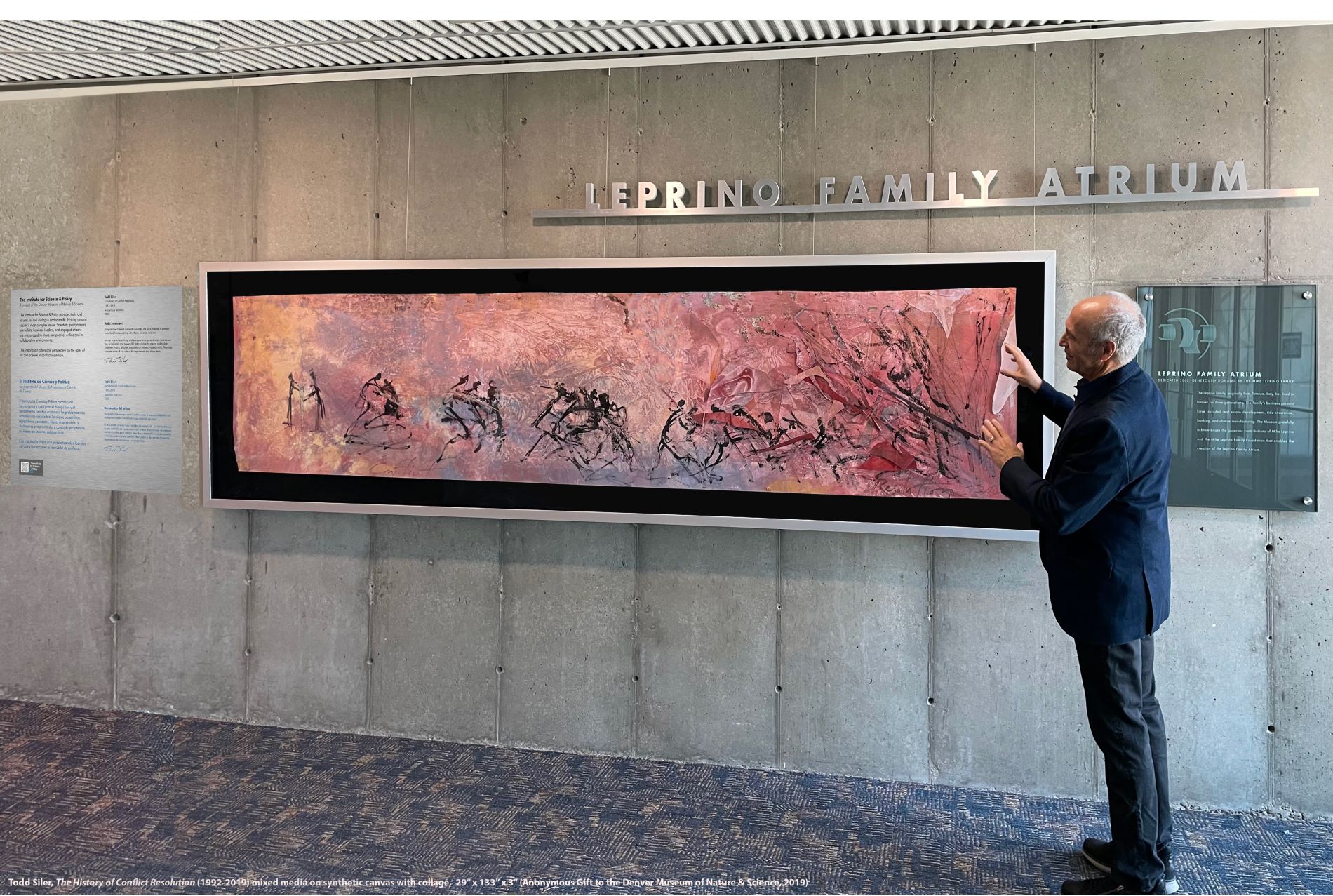Discover the latest news, explore exhibits and connect with the natural world. Visit Catalyst Online
Members receive free admission to the Museum 364 days a year! Become a Member
Take your Museum journey home with you. Visit the Museum Shop
Museum Artwork Provides a Visual Journey Through Conflict

Walking through the Museum’s West Atrium, an expressive, abstract painting catches the eye. At first glance, it could be an ancient artifact but upon closer examination, you will see that its earthy red tones and colors are painted upon canvas. Spend a few minutes with Todd Siler's "The History of Conflict Resolution" and you may find yourself reflecting on themes and questions related to our human condition — such as communication, war and peace — in an unexpectedly profound way.
The painting can be thought of as something like a short film. On the left side of the canvas, you observe a very calm situation with two figures engaged in some form of interaction. Siler explains the figures represent two people talking about something they both want. As they're talking and we move our eyes to the right of the piece, there's tension and the two figures begin a struggle that devolves into chaos.
The piece, Siler explains, is a visual representation of how human conflicts escalate and can be resolved. Siler explains that you can look at the art starting from the either side, choosing to see the dialogue moving toward chaos or the chaos moving back to dialogue. Told through swirling colors, collage and abstract shapes, the art has a timeless quality to it, expressing this basic story of human conflict.
“When you look at humanity, there seems to be a pattern from sort of order at one moment to chaos and then it returns full cycle,” said Siler.

Artist Todd Siler and world-renowned soprano Renee Fleming at "Mind Matters" art exhibition held at the Center for Bioethics and Humanities at the CU Anschutz Medical Campus on November 12, 2019. (Photo/ David Weil)
Museum President George Sparks and others from the Museum encountered "The History of Conflict Resolution" at Siler's art exhibition "Mind Matters" at the Center for Bioethics and Humanities at the CU Anschutz Medical Campus. The piece spoke to George and other members of the Board, triggering a deep conversation over lunch. From there, the piece was donated to the Museum.
Its arrival at the Museum in 2020 couldn't have been more appropriately timed. As the world grappled with a pandemic and social upheaval, the piece’s themes of conflict, communication and resolution felt more relevant than ever.
The arrival also coincided with the expansion of the Institute of Science & Policy (ISP) at the Denver Museum of Nature & Science. Executive Director Kristan Uhlenbrock explains that ISP is an initiative that focuses on bridging the gap between scientific research and public policy by fostering dialogue and collaboration among diverse stakeholders. In her work, Uhlenbrock has taken groups of stakeholders who are dealing with complex and often divisive issues — such as water rights in Colorado — and brought them to view the piece. By reflecting on the artwork, these groups are encouraged to think about the nature of conflict and the potential for resolution.
“The piece is a great way of illustrating how we approach our work. The Institute believes that we can bring people together, bridge divides and find common ground. But to do that, we have to recognize that conflict exists, and that's okay,” said Uhlenbrock. “The goal is to evolve and move through that conflict to make progress.”
Siler hopes the piece will inspire guests in the Museum and the public to engage in the kind of dialogue necessary to tackle the big issues facing humanity. "Imagine how different our world would be if it were possible to prevent every feud over something, either material or immaterial, before it escalated into chaos, violence and war.”

Early morning view of Denver skyline and downtown in spring from sky terrace at Denver Museum of Nature & Science. (Photo/ Rick Wicker)
The painting’s placement in the expansive West Atrium — looking out toward City Park, the Denver skyline and the snowcapped Rocky Mountains — was intentional. As Museum guests emerge from the horizon-expanding Space Odyssey exhibition, Siler explains the idea is to invite them to reflect on how we can navigate humanity’s challenges as we venture into the cosmos.
So, next time you're at the West Atrium, take a moment to look at and reflect on the deep meaning behind “The History of Conflict Resolution.” Whether this allows you to reflect on human history, the present moment or ponder an interstellar future for humankind, let it sit with you for a while and hopefully you will walk away with a renewed sense of our shared future and the importance of finding common ground in the face of conflict.
This browser is no longer supported.
We have detected you are using a less secure browser - Internet Explorer.
Please download or use Google Chrome, Firefox or if using Windows 10, you may also use Microsoft's Edge browser.